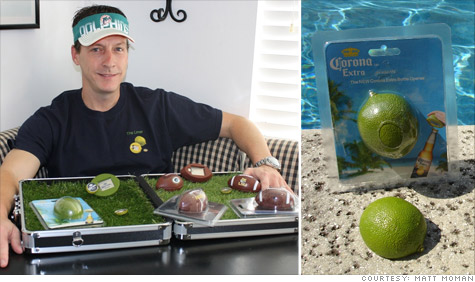
Matt Moman, an independent entrepreneur, is struggling to find a U.S. manufacturer to make his Corona Extra Lime bottle openers.
NEW YORK (CNNMoney) -- President Obama wants companies to manufacture their products in the United States, but small business owners say that's about as easy as walking a minefield.
Building an American factory or partnering with one is fraught with challenges including higher labor and material costs, complex regulations and - in some states - a debilitated manufacturing infrastructure.
"The government and states have to support" small business more, said Mei Xu, owner of Chesapeake Bay Candles.
Xu, who is Chinese American, knows the hurdles well. She has imported her candles from China and Vietnam for 17 years. But she decided to open her first factory in Maryland last June because China was becoming too expensive.
In April 2009, she picked a 124,000-square-foot factory/warehouse off the I-695 Baltimore beltway in Maryland that once belonged to a liquor distributor and proceeded to rent it.
But consumer goods manufacturing had been dead for decades in the area; and the office of permits and licenses could not immediately tell her the proper codes for her manufacturing facility.
So Xu hired contractors and engineers to update the facility and bring it in compliance with fire codes. Then she had to apply for a permit and wait to be approved. That entire process delayed the factory's opening by six months and cost her an additional $2 million.
"We didn't pay that with a small business loan," she said. "That came from our savings."
Still, she's not bitter. Her factory has created 50 new jobs in the area. And she hopes to grow that to 100 this year. "We're trying to do the right thing and bring jobs back even though Made in USA is still more expensive," she said.
Florida-based inventor and entrepreneur Matt Moman wants to produce his Chinese-made Corona Extra Lime bottle openers in the United States. But he doesn't have the financial means to open a U.S. factory.
"It doesn't make good business sense," said Moman, who created the bottle opener in 2007. "I'm an inventor, not a manufacturer. Labor is still so much more expensive [in the United States]. I can't do it."
But finding a U.S. manufacturer willing to make his openers is proving difficult. He has reached out to two manufacturers in south Florida who were interested but told Moman that the quantity of openers he needs is too small for them, and they'd eventually lose money making them.
Meanwhile, Moman is losing money.
After he invented the opener, Moman snagged a licensing deal with Corona. Since then the item has done well in the United States, selling in stores, such as Walgreens (WAG, Fortune 500).
But rising labor costs in China have begun to eat into his revenues. And production delays have meant missed business opportunities.
"It took half a year for me to get my first delivery" of the lime bottle openers, said Moman. His latest frustration is tied to the production delay of football-shaped bottle openers he was hoping to get before the Super Bowl.
He placed the order last fall and it took three months for the same Chinese supplier to make them. "The earliest that I can now get them to retailers is at the end of February," he said. "We missed the Super Bowl. That's a huge miss for us."
Having a domestic manufacturer would have sped up the process, he said.
If he finds an interested manufacturer "who sees the potential" in his products, Moman is willing to give a significant portion of shares in his company to the owner.
Plaid Enterprises, an Atlanta crafts company, manufactures most of its products in the United States, including its line of hobby paints.
"Plaid Enterprises would love to become 100% all-American," said Leanne Melton, the company's supply chain manager.
The hitch: The brushes and craft pieces made by U.S. companies are more expensive then the ones made in China.
Melton did succeed in finding a U.S. supplier of iron-ons -- literally in the company's backyard -- after 12 years of importing that product from China. That supplier was just two miles from Plaid Enterprise's Atlanta office.
"I couldn't believe it," she said. "They made the same items and their price was 40% less." ![]()